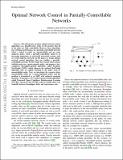| dc.contributor.author | Liang, Qingkai | |
| dc.contributor.author | Modiano, Eytan H | |
| dc.date.accessioned | 2020-07-16T12:19:50Z | |
| dc.date.available | 2020-07-16T12:19:50Z | |
| dc.date.issued | 2019-07 | |
| dc.identifier.isbn | 978-1-4503-6764-6 | |
| dc.identifier.uri | https://hdl.handle.net/1721.1/126216 | |
| dc.description.abstract | The effectiveness of many well-known network control algorithms (e.g., MaxWeight) relies on the premise that all of the nodes are fully controllable. However, these algorithms may yield poor performance in a partially-controllable network where a subset of nodes are uncontrollable and may take arbitrary (possibly adversarial) actions. Such a partially-controllable model is of increasing importance in real-world networked systems such as overlay-underlay networks and uncooperative wireless networks. In this paper, we study two fundamental network optimization problems in a network with adversarial uncontrollable nodes. First, we investigate the network stability problem where the objective is to stabilize the network whenever possible. We develop a lower bound on the total queue length that can be achieved by any causal policy, and propose a throughput-optimal algorithm, called Tracking-MaxWeight (TMW), which enhances the original MaxWeight algorithm with an explicit learning of the behavior of uncontrollable nodes. Second, we study the network utility maximization problem where the objective is to maximize cumulative utility subject to stability constraints. We provide a lower bound on the utility-delay tradeoff, and develop the Tracking Drift-plus-Penalty (TDP) algorithm that achieves tunable utility-delay tradeoffs. | en_US |
| dc.description.sponsorship | National Science Foundation (U.S.) (Grant CNS-1524317) | en_US |
| dc.description.sponsorship | United States. Defense Advanced Research Projects Agency. Information Innovation Office (Contract HROO l l-l 5-C-0097) | en_US |
| dc.language.iso | en | |
| dc.publisher | ACM Press | en_US |
| dc.relation.isversionof | 10.1145/3323679.3326508 | en_US |
| dc.rights | Creative Commons Attribution-Noncommercial-Share Alike | en_US |
| dc.rights.uri | http://creativecommons.org/licenses/by-nc-sa/4.0/ | en_US |
| dc.source | arXiv | en_US |
| dc.title | Optimal network control with adversarial uncontrollable nodes | en_US |
| dc.type | Article | en_US |
| dc.identifier.citation | Liang, Qingkai and Eytan Modiano. “Optimal network control with adversarial uncontrollable nodes.” Mobihoc '19: Proceedings of The Twentieth ACM International Symposium on Mobile Ad Hoc Networking and Computing, Catania Italy, July 2019, ACM Press, pp. 101-110 © 2019 The Author(s) | en_US |
| dc.contributor.department | Massachusetts Institute of Technology. Laboratory for Information and Decision Systems | en_US |
| dc.contributor.department | Massachusetts Institute of Technology. Department of Aeronautics and Astronautics | en_US |
| dc.relation.journal | Mobihoc '19: Proceedings of The Twentieth ACM International Symposium on Mobile Ad Hoc Networking and Computing | en_US |
| dc.eprint.version | Original manuscript | en_US |
| dc.type.uri | http://purl.org/eprint/type/ConferencePaper | en_US |
| eprint.status | http://purl.org/eprint/status/NonPeerReviewed | en_US |
| dc.date.updated | 2019-10-30T17:09:20Z | |
| dspace.date.submission | 2019-10-30T17:09:26Z | |
| mit.journal.volume | 2019 | en_US |
| mit.metadata.status | Complete | |
